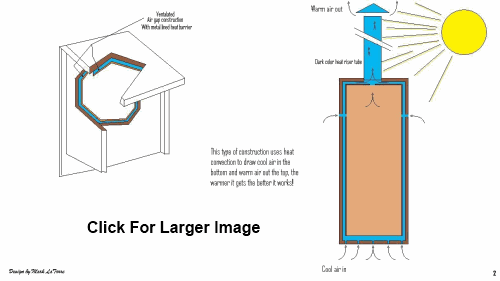
Bluebird House Plans Designed To Keep Eggs & Nestlings Cool During Hot Weather
We received pictures and plans for a bluebird house from Mark LaTorre from Alabama.
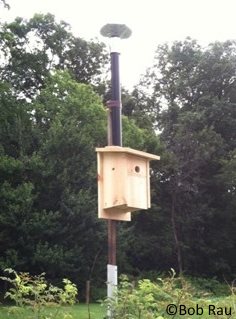
Mark had bluebirds nesting for the third time in July last year and was concerned that the bluebirds and eggs were getting over heated during the hottest days.
On a 98 degree day, he noticed the female was panting heavily with her head out of the box.
No doubt, the female was stressed and that probably meant the eggs were also heat stressed.
One of the eggs from that clutch did not hatch and Mark thinks this may be due to heat stress. It is a wonder that any of the eggs hatched.
It has also been documented that heat stressed eggs can have lower fledging success even if they do hatch, so everything we can do to reduce heat in the nest box can help increase the number of young that fledge.
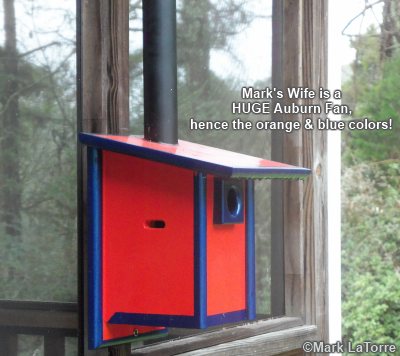
A Cooler Bluebird House Design
Mark obviously has carpentry skills and has designed a bluebird box with an airspace between the inner and outer walls.
In addition, the plans include a black vent pipe that when heated, will draw air into the air space from below the box (See photo above). But first, all you "Roll-tide" fans, brace yourselves.

Yes he did. Those are Auburn Tiger colors. For those of you who don't know, we're talking Auburn University Football.
Mark says he has never painted a box before, but so much time and effort went into this project, that he wanted it to last. If you're going to paint it, might as well paint it with the colors of your favorite team, or in Mark's case, his wife's favorite team.
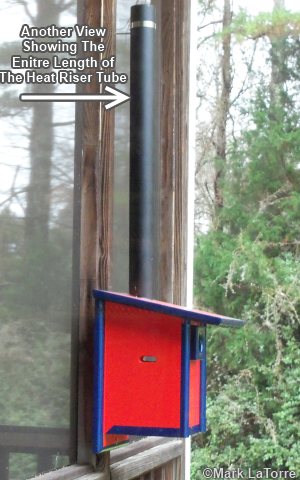
We have no doubt this design will reduce the temperature inside the nest box considerably on very hot days, but will the boxes be too cool on those cold spring days?
Perhaps the exhaust pipe can be plugged to prevent the convection current during the early spring when a little extra heat might be a good thing,
The exhaust pipe could be unplugged as daytime temperatures rise above the 90s (degrees F).
Bluebirds eggs and nestlings can tolerate temperatures above 104deg F for short times, but temperatures above 107deg F will kill them.
Even if they hatch, their ability to grow properly my be compromised and their survival may still be threatened.
We discussed the "Problems with Heat and Bluebird Boxes" on our other bluebird house plans page.
Official temperatures are measured in open shade 1.5 meters above the ground.
Most bird nest boxes are placed above ground, but many are not placed in the shade.
We have measured temperatures inside empty bird nest boxes above 105� F on several occasions.
This summer, we plan to make some side by side comparisons of boxes in direct sun to measure the effects of some simple shading devices that can be used in emergencies.
We hope Mr. LaTorre will also record some temperature reading inside his bluebird house to see how effective the ventilation system is.
Thanks again Mark for your efforts to make a better bluebird nest box.
We hope your hard work is rewarded with three successful clutches of bluebirds this nesting season.
Mark's Bluebird House Update
After the bluebird nesting season was over, we asked Mark how his occupancy rate was:
I did record through the entire summer that year and found that the temp in my screened in shaded porch was the same as the bird house that was located in the afternoon sun on the west side of the house.I built one of these for my sister and she sees a clutch every year.
I on the other hand have not been as fortunate with mine, I think I have it mounted too close to the windows.
That's awesome that his sister has had a successful clutch every year in his hot-weather bluebird house design. Mark's box may be too close to the windows or some other various reasons.
Birds can be fussy about choosing their nesting cavity.
We had a bluebird house mounted near our front porch. The first couple of years the bluebirds used it, then all of a sudden stopped.
We saw them flying around the box, but never began nest-building. We think our trees and shrubs around the front yard grew tall and dense enough that it became to enclosed and not enough open space which bluebirds prefer.
Bluebird House Plans
Below are Mark's plans. This project is not for beginners.
For easier plans, see this One-Board Bluebird House Design.
The plans show enough detail that experienced builders will be able to figure it out. If you have any questions use our contact page.
Ventilated Air Gap Construction and Heat Convection Keeps The Birdhouse Cool
Cross Section View of the Bluebird House
Bird House Insulation View
Mark sent another pic that helps show how the box was constructed.
The photo shows the inner Lauan box inside the outer box, with the insulation, spacers and air space. Also notice the pocket screws used to hold the sides to the bottom.
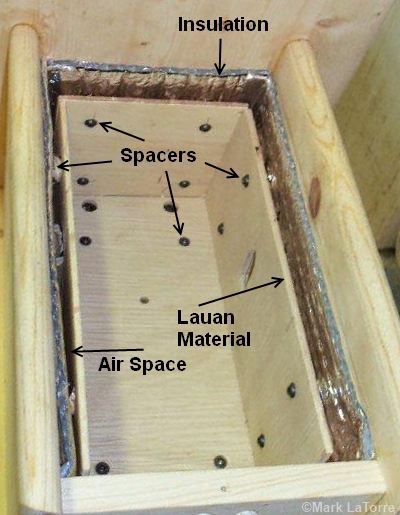
Bird House Vent Pipe Close-Up
Mark also sent more pictures of the construction of the vent pipe (heat tube) and cover (deflector cone or rain cap).
His first house is protected by the eave of his house, so does not need the cover.
His sister's box will be mounted in the open, so a cover is needed to prevent rain from dripping into the box.
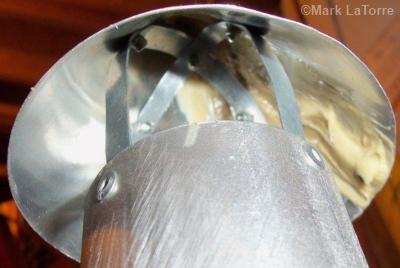
The deflector cone is made by cutting a slice out of a flat circle of aluminum material and the cone is formed when the slice is pinched back together.
A paper model is a good way to test for best size of circle and slice of material to cut for the desired cone.
The photo shows the cone attached to an aluminum tube with aluminum straps with pop rivets.
The entire assembly was then slid down inside the black PVC pipe and pop riveted into place.
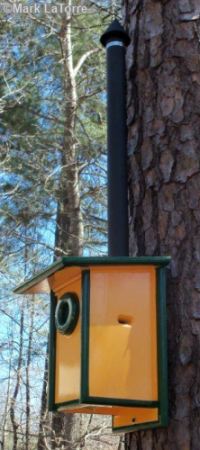
Mark also installed a grating in the top of the tube to keep the squirrels from stopping up the tube with acorns and sticks.
Bluebird House with a Squirrel Guard
As we noted above, Mark built a second bluebird house for his sister with a rain cap on top of the vent pipe, but also with a metal bird house hole guard over the entrance hole to keep the squirrels from chewing it out.
Follow the link above to check out how he installed the washer and donut cover over the entrance hole.
Another Bluebird House Built
Recently, a visitor to our website submitted photos of the bluebird house he built using these hot-weather plans.
Bob first contacted us regarding the vent pipe. He could not find black PVC pipe, so as an alternative he spray painted it black.
The dark colored pipe will heat up more so than the white PVC which helps moves the hot air out from inside the box.
Compliments of Bob Rau, below are additional photos and comments that may help you with building this house.
"Hi, we finally got the ventilated bird house made and it turned out great.In fact we already have a pair of bluebirds checking it out. Here is a few pics of the house in the making and finished and mounted.
We did not paint it as we like our houses with the natural wood look."
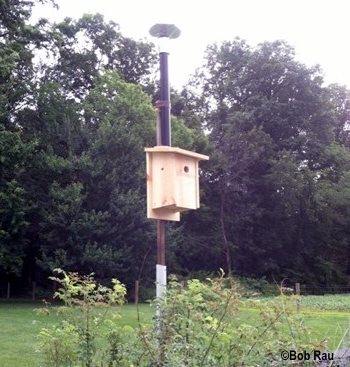
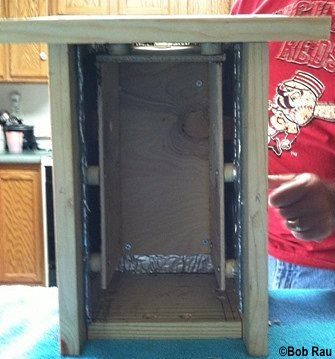
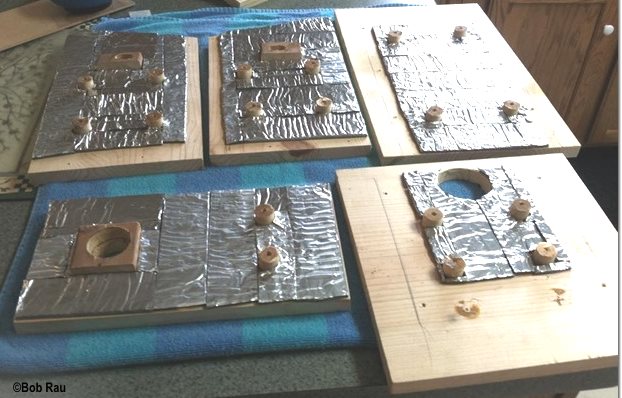
"As of this morning we have had a pair busy building the nest already in the new box!!! We are excited." And the next day..."Hi, we are so excited to report that our pair of bluebirds finished their nest building and as of today have two eggs laid in the new ventilated nest we built last week for them. Above is a picture of the finished nest inside the new box."
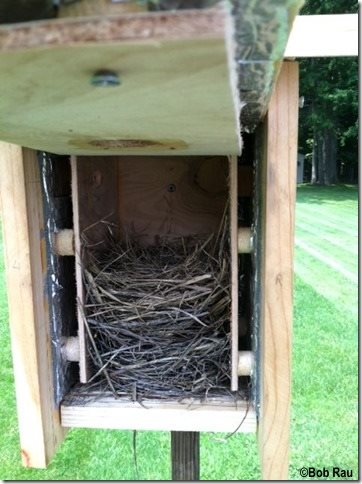
More Tips from Another Builder of the Bluebird House
We recently had another visitor take on the challenge of building this hot-weather design bluebird house, Ted McNabb.
He submitted the following narrative to us titled, Saga of the Bluebird House:
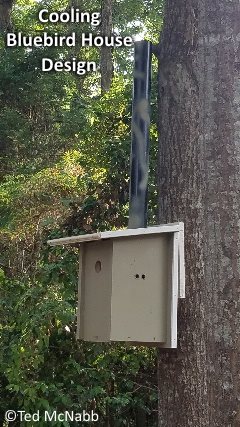
Ted's Disclaimer and Backstory
Before I begin I offer my disclaimer. I am neither an engineer nor a true woodworker. I am more of a "hold my beer I want to try something" kind of handyman (after a fashion).
The online plans were impressive and I became intrigued enough to give it a go since I live on the coast in Low Country South Carolina where...yeah...it gets hot.
We've just started watching birds at a squirrel-proof feeder not too long ago (I'll save the raccoon story for another time). As I sit on my screen porch in the morning drinking my coffee watching that feeder keeping my binoculars and bird book handy, the whole thing has grown on me. And I've become partial to bluebirds. So, that's the backstory.
Interior Box
I have a bit of a shop most of which I inherited from my dad (who could design and make furniture) and a sufficient amount of acceptable scrap wood. I studied Mark LaTorre's plans repeatedly and decided not to try to find and figure out the placement of the metal-backed insulation although clearly that would be an additional asset.
I had a few questions I had for the website one of which was to learn upon quick reply that the interior box for the bluebirds needed to be placed predominantly if not totally inside the venting holes in the floor leaving them open to help circulation in the air gap between the outer and inner walls. I had some nice pieces of cedar paneling about the same thickness as lauan so I used that to form the interior box.
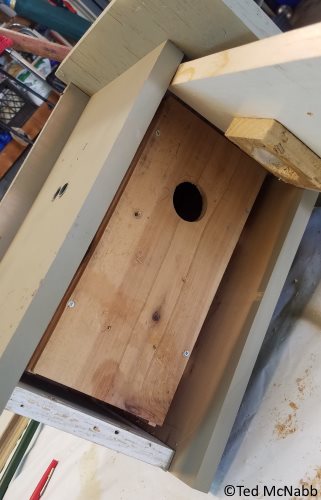
Circular Spacers
After I had made my cuts for the outer and inner boxes in beginning to try to put everything together I realized I couldn't make the little circular spacers called for in the plans so I just found a piece if scrap the appropriate thickness, pre-bored my holes to keep the small spacers from splitting from the expanding force of the screw, and cut them into approximatley squares with my chop saw.
Putting It Together
This next part is hard to word correctly: How to put all this together...and make it fit. Mark's plans are precise, so that helps. So, I then went to my drill press (a hand drill should work) and at the appropriate spots laid out in the plans with the same size drill bit that I had used to pre-bore in the spacers, bored through the back and sides of my inner box.
Then I very slowly so as not to crack the spacers added a screw to one of the holes in my interior cedar panels and held a spacer in place as the screw then went through both panel and spacer, then repeated this until all the spacers were in place upon each panel.
I used a screw of just the right length to allow me to then go halfway into the corresponding outer panel of the bird box which gave me a very sturdy connection but with no screws visible from the outside of the box.
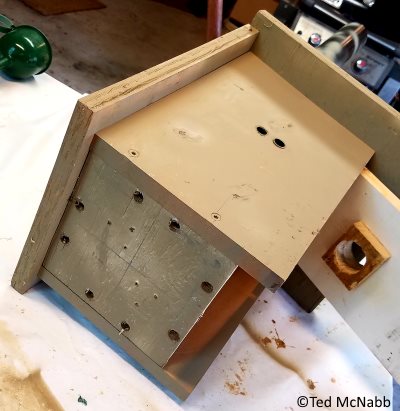
Alas, while I can remember how I managed to fit all this together so that the inner bird box was "tight" and relatively seamless the description of the process is daunting.
Suffice it to say I put the outer and inner sides together first, temporarily screwed the outer sides into the floor, took my final "make it fit" measurements of the back of the interior box and then trimmed that back piece to fit.
Only then did I bore my holes in that back piece, add my spacers, and then secure it to the back of the "outer" box. If you can follow that then bless you. If not, ask someone to hold your beer and you can figure it out...probably better.
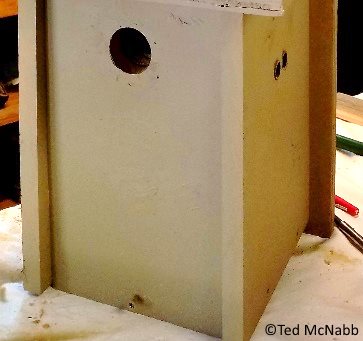
Then I carefully went ahead and screwed shut the front of the interior box with small, easily removable screws (more of that later) and then hinged the front exterior at the top and secured it to the floor with a partially sunk 2" starhead screw which would act as a handle to pull up the front panel to access the front interior once loosened.
Air Seal, Side Vents
I used the same paddle bit with which I cut the entrance holes in the outer and inner boxes to fashion an air seal using a piece of wood that was the right thickness (picture). For the side vents I found a piece of a long plastic funnel I no longer needed which happened to be 1/2" in diameter.
Since the plans called for the side vents to be 1" wide by 1/2", I simply used my drill press (any drill could do) to bore 2 half inch holes through the outer and inner sides, marked, cut, and tapped into place the tubing so that the interior box could vent directly to the outside as called for in Mark's plans.
Chimney
I had a question about how best to cut the hole for the "chimney" in the top. I happened to have a 2 1/4" forstner bit and an excellent drill press which did the trick perfectly, but expect most people will not have this and, therefore, some advice in this area for others should be helpful. (Birdwatching Biss edit: Bob the builder from above later told us that he cut the hole with an expandable drill that goes up to 3 inches and cut the PVC with a hand saw.)
The 2" PVC fit perfectly snug in that 2 1/4" hole. I painted it black as recommended, but decided to put a little camouflage streaking on it to help it blend with the background and, hopefully, not upset the updraft potential of the pipe too much.
Mounting
Since I knew I would need to take down the box to raise the front exterior panel and then unscrew the front interior of the birdhouse in order to clean it periodically I wanted to fashion an easy on/easy off way of mounting the box.
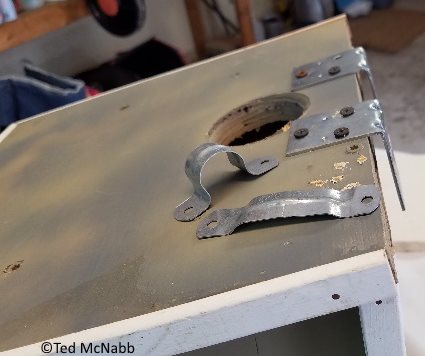
I went into my cache of hardware supply stuff and pulled out two...I guess you call them pipe-hanging brackets and then two maybe 1 1/2 wide metal L braces. I wanted width for greater stability.
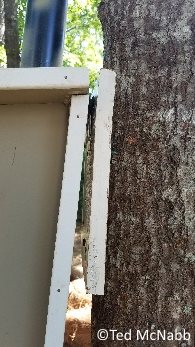
I flattened out the pipe brackets with a tack hammer to fit the width of the L braces, screwed them to another piece of painted scrap board as a mounting board (see picture), screwed the L braces pointing down behind the birdhouse, used some fairly hefty star-head screws to fix the mounting plate to the tree we'd picked out, and then just hung the birdhouse on the mounting plate. Done.
Simpler Bluebird House Plans
For those of you who want easier-to-build bluebird house plans....
Bluebird House Plans - Basic one-board bluebird bird house plans and others including Peterson, Gilbertson and boxes for Western and Eastern Bluebirds.
The Complete Guide to Attracting Bluebirds
Eastern Bluebird Facts and Info
|
Our Favorite Bird Watching Binoculars, Squirrel-Proof Feeder & Hummingbird Feeder Read Our Reviews: |
||
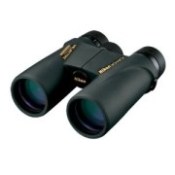
Nikon Monarch M5
Best mid-priced bird watching binoculars. Waterproof, shockproof, multi-coated ED-Glass. |
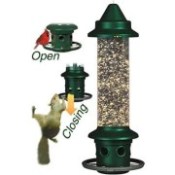
|
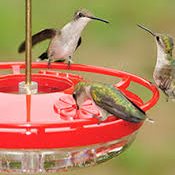
Best Hummingbird Feeder
Drip-Free, Ant-moat, Durable, Easy to Fill and Clean. |
| Click Images or Links To View More Info | ||

